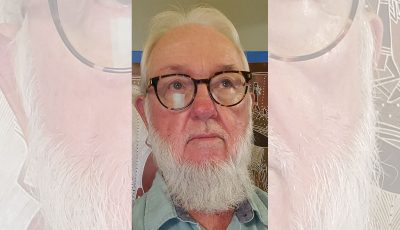Ignorance by an ignorant is what?
Several days ago, Mr. Ambrose Bennett responded to my letter that appeared in your paper, and he felt intimidated because I noted to your readers that he plagiarized a publication in Wikipedia, and then branded me as an “ignorant” person. Mr. Bennett wrote, “Macbeth is a tragedy written by William Shakespeare, and is considered one of his darkest and most powerful works.” This was copied word for word from a Wikipedia article. He wrote it, I didn’t. No one asked about what he wrote, and as a revered writer that he thinks he is, plagiarism is a cancer of originality in thoughts and knowledge. Thus, ignorance manifested of Ambrose Bennett’s literary work is the subject of your readers’ reaction and trust of his dire effort. And, it is not good.
What caught my attention was Mr. Bennett’s assertion stating, “Macbeth is a tragedy…, and is considered one of his darkest and most powerful works.” I know that Macbeth’s theme was on human tragedy, but that was only incidental to my thoughts as I was perplexed of the idea where Mr. Bennett may be spewing that William Shakespeare’s poetic creation was the tragedy, hence, suggesting that William Shakespeare had it all wrong.
My thoughts were spinning like tornado. To understand, one must ask. So, I asked myself, do we blame Albert Einstein for the destruction of the atomic bombs when they exploded at the cities of Hiroshima and Nagasaki in Japan killing innocent children, mothers, and fathers just before the end of WWll? Or, do we blame Isaac Newton for the people who were situated at a balcony of an apartment building in Berkeley, CA, a few weeks ago and plunged to their deaths when that portion of the building gave way? And, Sigmund Freud may be just as dumbfounded diagnosing Mr. Ambrose Bennett’s superego motivation on turbo drive in denial and free range mode when he made the intention and willful joy to plagiarize an article in Wikipedia. On the other hand for your information Mr. Ambrose Bennett, William Shakespeare’s production of Othello, King Lear, Antony and Cleopatra, and Hamlet makes interesting conversation and don’t be surprised that all human beings use them sparingly in random order and we are not fully aware that they exist.
Plagiarism is the “wrongful appropriation” and “stealing and publication” of another author’s “language, thoughts, ideas, or expressions” and the representation of them as one’s own original work. (1995, Random House Compact Unabridged Dictionary; and, Oxford English Dictionary). In Chamorro, the closest word that connects with plagiarism is “dakun.” Often said by our elders is the metaphor, “chaka de guma, nungka de gacha.” This makes good nexus to plagiarism and we could understand it by connecting the dots this way to draw what stealing of knowledge belonging to someone is all about. This is not being sarcasm to no one. As it were, the Chamorro language is bankrupt of words such as “plagiarism.” The tragedy lesson here is not Wikipedia’s words copied and falsely used by Mr. Ambrose Bennett to bring a point, it is Mr. Ambrose Bennett who thinks greater than himself. We learned this via Polonius in Hamlet, by the way, binding within us “to thine own self be true.” But, there is a problem here in that one cannot be true to “thine own self” unless one actually knows who “thine own self” is. Self-knowledge is unique to humans. As the old saying goes, “Barking dogs don’t bit, but they don’t know it.” I dadao na galago ti ufanaka, lao ti matungu put enao.
In Hamlet once again, the big question is “to be or not to be.” Mr. Bennett’s fuss often dwindle to joking prose of the “I told you so,” or “I predicted so and so,” or “I said it before, and you have it all wrong” says unequivocally about the “self” in his persona. What does “to be” mean? What exactly is “being”? Or, What does it mean to be someone who exists? We see the character in the Dirty Harry (Clint Eastwood movie productions) and in John Wayne’s movies of cowboy stories about the western frontiers when the new settlers were clearing and wiping out the native Indians along the ways to the rugged western frontiers. The authentic self in the character did not have friends. It is my way or the high way, period. This was not a kind of “they-self” kind of person. This is a person that looks boldly only to fend himself for answers. And, the only answers that have any value are the ones we come up with ourselves. One owns his private, individual existence. And, Mr. Bennett’s point of view has its own grip in counterpoint to those professing they-selves, and who seem not to have any kind of grip on themselves at all. When this obviates in its true color, and not the we niggardly love to diminish such, Mr. Bennett seems to have a handle of himself alone. But, that was not the important part, this lad knows who he is and what he wants, and none of that information was derived from others. But, only to the point where we end up scratching our head, are the indigenous people of the NMI better off letting Mr. Ambrose Bennett continue to dance for more rain in a rainy days during monsoon season of the year. So, Hamlet is a real phenomenon that creeps in ones tragedy, nonetheless.
Lastly, Mr. Ambrose Bennett, I was not interested in Macbeth that urged me to search Wikipedia for information more than my interest for the meaning of “tragedy” as I have no clue what it is in my Chamorro lingo. However, having access to a Computer Assisted Detection (CAD) on information retrieval (IR) drew me to how I found that you plagiarized an article in Wikipedia. This plagiarism detection system (PDS) works wonders in micro scoping written products of literary value. Book publishing companies and newspapers organizations extensively use this system as their only means for survival and journalistic honesty. By way of fingerprinting, string matching, bag of words, citation analysis, stylometry, performance, and excellent memory; your type of writing is easy to detect of the violation of this fundamental rules and tradition of honest, truthful, and deserving writing. Yours was a classical specie that shine on your dishonesty and flagrant disregard of respect for those who strive to make good in what they do. You pay the price for thinking greater than yourself. Frankly, ignorance is looking for a black marble in a dark room during a stormy night when the lights were out. Your honesty in your writing should be your own, but stealing ideas from someone’s is likened to a dinner meal that makes laxatives good for bowel stimulation. And, ignorance by an ignorant is what?
Francisco R. Agulto
Kanat Tabla



























